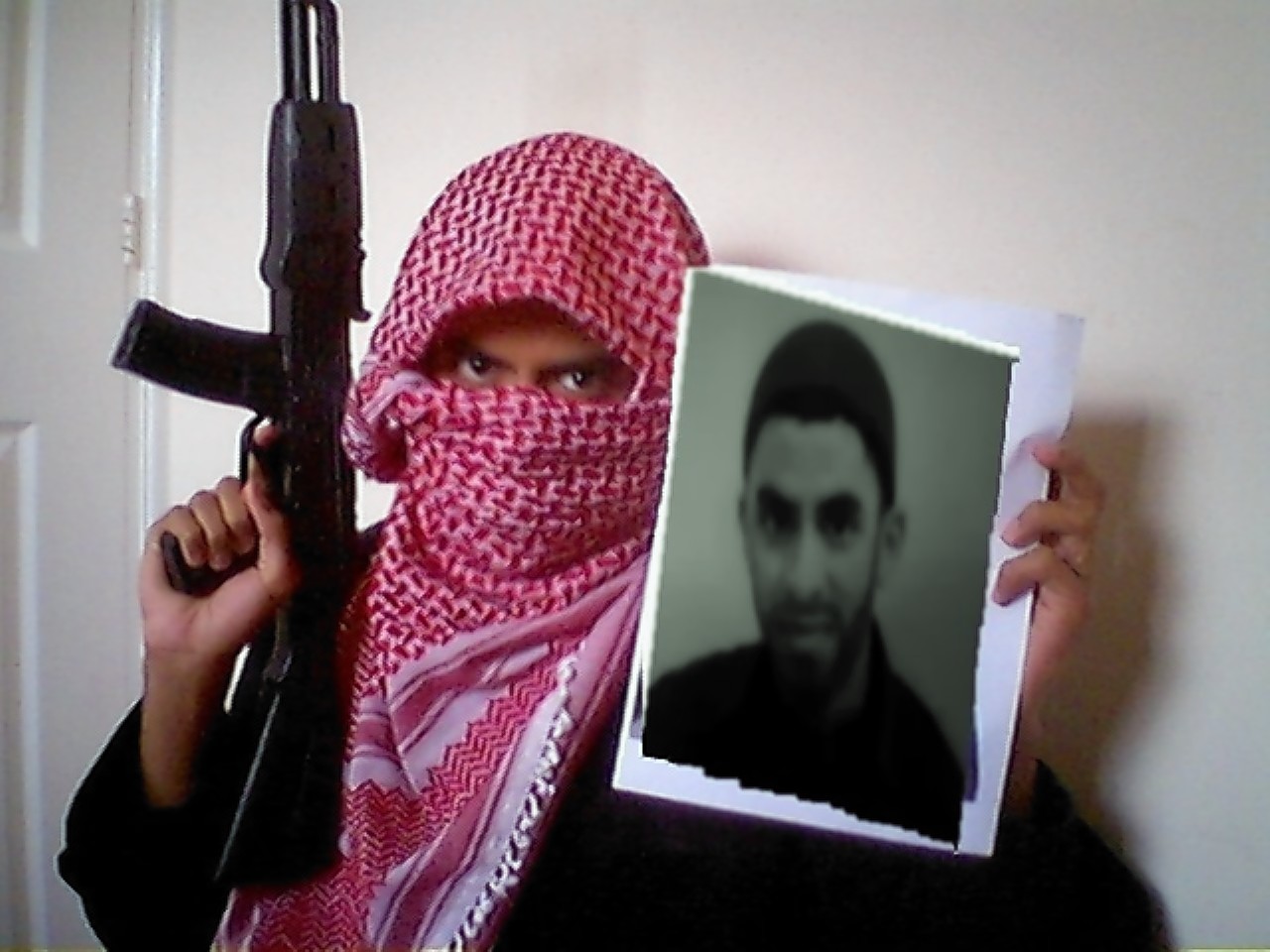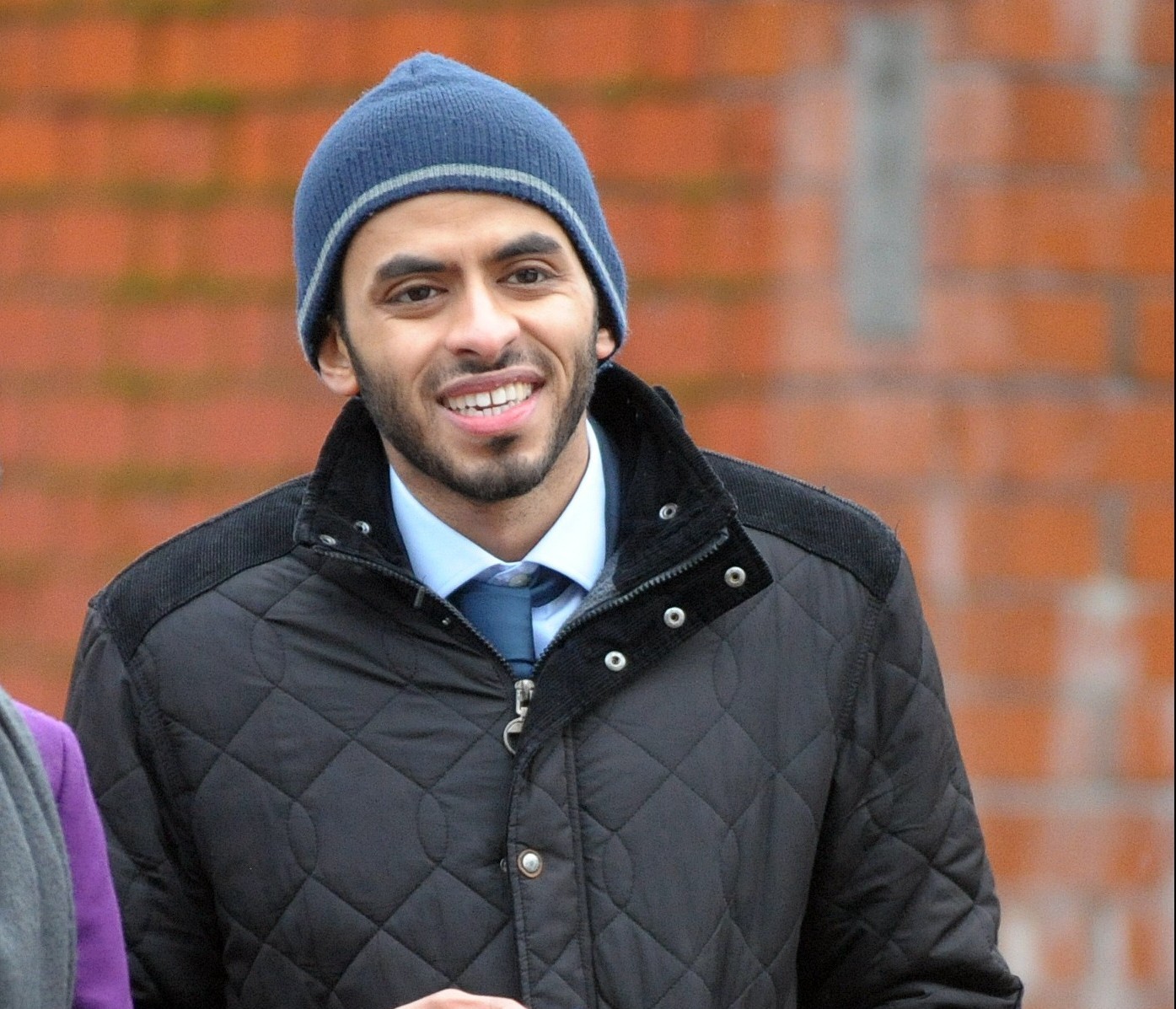An aspiring doctor cleared of preparing to commit terrorist attacks last night said photograph of him dressing like an insurgent was a teenage prank – and likened it to when Prince Harry dressed up as a Nazi.
Yousif Badri walked free from Glasgow High Court yesterday after a seven-week terrorism trial.
The 29-year-old former Aberdeen University student had been accused of downloading extremist magazines, books and videos which would be useful to someone preparing to commit an act of terrorism.
But a jury of 10 women and five men took less than six hours to find him not guilty of the two charges against him.
Following the verdict, judge Lord Turnbull told the jurors he “wholeheartedly agreed” with their decision and wished Mr Badri well in his future career.
During the trial jurors were shown images of Mr Badri posing with what appears to be an AK47, however it emerged during evidence that the gun was a plastic toy.
And speaking to the Press and Journal last night, the young medic said the photo was taken as “joke between friends”.
He said: “I was a teenager at the time, almost 10 years ago. Of course with hindsight I wouldn’t do a joke like that.
“But had I been told as a teenager that I would appear in a high court charged with terrorist related offences, and that the photo would be used as evidence, I honestly wouldn’t have believed it.
“It’s a bit like what Prince Harry did with the Nazi salutes, or even the Queen, or even Chris Smalling for that matter. It was a practical joke that can easily be misunderstood as being very sinister.”
Mr Badri added that with hindsight he would have made more apparent use of the research he was carrying out by conducting lectures on countering violent extremism.
He said he was also considering applying for a Masters degree in the field to make use of his knowledge.
Commenting on the verdict, the young man said he wanted to “thank God” for answering his prayers and said he felt he had been a victim of the criminal justice system’s ignorance.
He said: “I must thank Lord Turnbull and the jury for their verdict. It brought to an end a very difficult chapter in my life.
“I hope and pray that no one else experiences what I have been through.
“I have spent over two years waiting for justice and waiting to clear my name, so that I can get on with my life and my career as a doctor.
“I am waiting to speak to Aberdeen University. I am hopeful they can help me get back on track.
“I have passed all my exams to graduate as a qualified medical doctor, so the issue is simple reintegration into the NHS.”
Mr Badri stressed he was “completely in favour” of investigating potential terrorist threats but said he was disappointed by the way his case was handled.
He said: “The tweet which was attributed to Inspire Magazine, demonstrated unbelievable ignorance on behalf of the investigating team. The tweet was a common, old Arabic proverb and for it to be attributed to Al Qaeda was ludicrous.”
Mr Badri said he hoped the British Moslem community would now work together to help educate their fellow citizens.
He added: “It is important not to judge a book by its cover and equally so not to judge individuals who are interested in this field as potential terrorists.
“The British Moslem community must also work with more determination and focus to help in the education process of fellow citizens so that extremists are denied the opportunity to promote their ideology and so that the correct information about Islam reaches a wider audience, especially those who are working in the sensitive area of counter terrorism.”
That picture… What did the court make of it?
During the course of the trial, jurors were shown a series of productions the Crown claimed displayed Badri’s interest in terrorism.
One image showed the 29-year-old dressed like an insurgent posing with what appeared to be an AK47.
However, it later emerged the so-called offensive weapon was nothing but a toy gun.
The court heard the investigation against the young man had been carried out by the then-newly formed counter-terrorism unit in Aberdeenshire, based in Inverurie.
Although his flat in Aberdeen’s Ashgrove Road was searched thoroughly, his family home in Halifax, Yorkshire was never searched.
The court heard the plastic toy gun they accused him of posing with was kept there, and could have been found if police had searched there.
And the jury also heard police were selective in the books they took during the raid – picking up three books in Arabic but leaving behind dozens of others.
Officers also – despite being a counter-terrorism unit – appeared to have little knowledge of insight into Islam or the Moslem religion and they even asked one of Mr Badri’s flatmates why they preyed five times a day.
Many of the alleged main planks of the prosecution case were thrown out during the course of the trial.
It was suggested that, because Mr Badri had a large tub of nails and no hammer, the nails could be an ingredient for a bomb.
But it was proved in court the nails had been brought to the flat by Mr Badri’s father while he was carrying out DIY work, and the hammer had been borrowed by a friend and not returned.
It was further claimed Mr Badri had been taking protein shakes and training to get his body ready for terrorist acts.
Pictures of Mr Badri’s bedroom, which showed weights he had bought online from Argos were also shown to the Jury.
Advocate depute Richard Goddard claimed that this showed the prospective doctor was preparing himself for battle.
But it emerged he had bought the exercise equipment in order to keep fit having had a pacemaker fitted in his early 20s.
The Crown also founded on a tweet sent on April 16, 2013, the day after the Boston bombing.
It read “whoever feels safe from punishment misbehaves”.
Prosecutors tried to prove he was quoting a chilling Al Qaeda battle cry, however the jury heard that it was actually a common phrase used widely in the Islamic world.
Last night Assistant Chief Constable Ruaraidh Nicolson, who ran the investigation, said they would “consider any issues arising from the case”.
He said: “We note the outcome of the proceedings today at the High Court in Glasgow and will consider any issues arising from the case. Police Scotland carried out an intensive investigation following intelligence about the activities of an individual of concern and the matter was fully reported to the Crown Office and Procurator Fiscal Service.
“Police Scotland works with a wide range of partners in the UK counter terrorism network in order to keep people safe and reduce the threat posed by extremist and terrorist activity.
“Local policing teams and specialist officers work closely to ensure that the community impact of such investigations is closely monitored and any issues which arise are responded to appropriately and sensitively.”
‘A culture of suspicion’
A Moslem leader has called for Scottish communities to work together to avoid creating a “culture of suspicion” in the wake of the Yousif Badri trial.
The Imam Ibrahim Alwawi, of the Aberdeen Mosque and Islamic Centre, issued the rallying call last night after the 29-year-old was cleared of two terrorism charges.
Mr Alwawi said the medical student – who was a regular at the mosque near Aberdeen University – was a bright young man simply trying to find the flaws in the arguments of Islamic extremists.
And he said that everyone must be able to have access to the information and facts that can expose lies put forth by radicalists.
Mr Alwawi said he did not believe Mr Badri should have ever been arrested, and described the prosecution and six-week trial a “waste of time, public money and resources”.
Last night the religious leader called for greater communication and cooperation between the Moslem community and the wider public to avoid a repeat of Mr Badri’s ordeal.
The Imam said: “What this verdict has shown is that just the possession of material which is freely available on the internet doesn’t establish one’s intent to commit a crime.
“Individuals must be free to conduct legitimate research without the fear of being charged with terrorism offences.
“Moslems are encouraged to seek knowledge and to learn about their faith, to establish the truth and to refute the falsehood.
“This is what Yousif Badri was doing and his intention was in studying the extremist material online.
“It is important that we do not allow our fears and insecurities to create a culture of suspicion against an entire community.
“This will affect the trust and destroy the unity of the society.”
Mr Alwawi described Mr Badri as “very peaceful and very kind” and said he was a “very smart and intelligent person”.
He added: “He was trying to refute and kill the arguments and radical views of extremists.”
And Mr Alwawi admitted he feared others within Scotland’s Moslem community may also fall foul of the law while simply trying to understand the radical arms of the Islamic faith.
“That is why we want to work with other agencies around us and we want to learn from what happened,” he said.
“This is a great tragedy. But this trial showed that the freedom of research is still here in Scotland and the justice system is protecting people but only after a long suffering.
“This should be a turning point. We want to work against terrorism and radicalism.”

